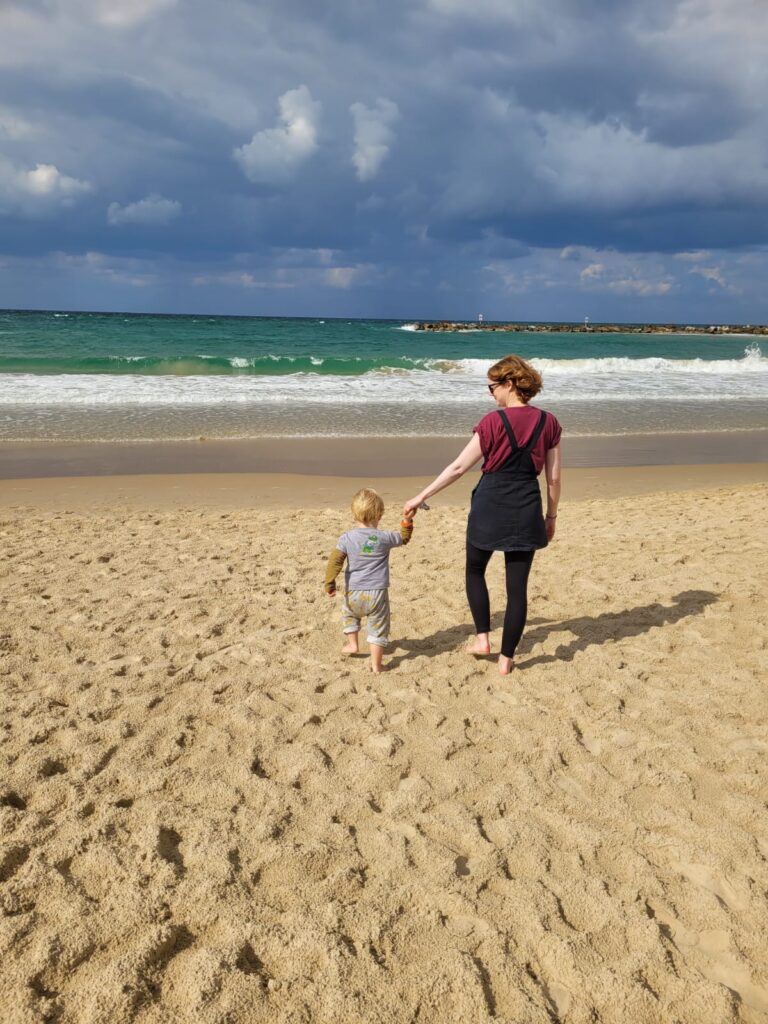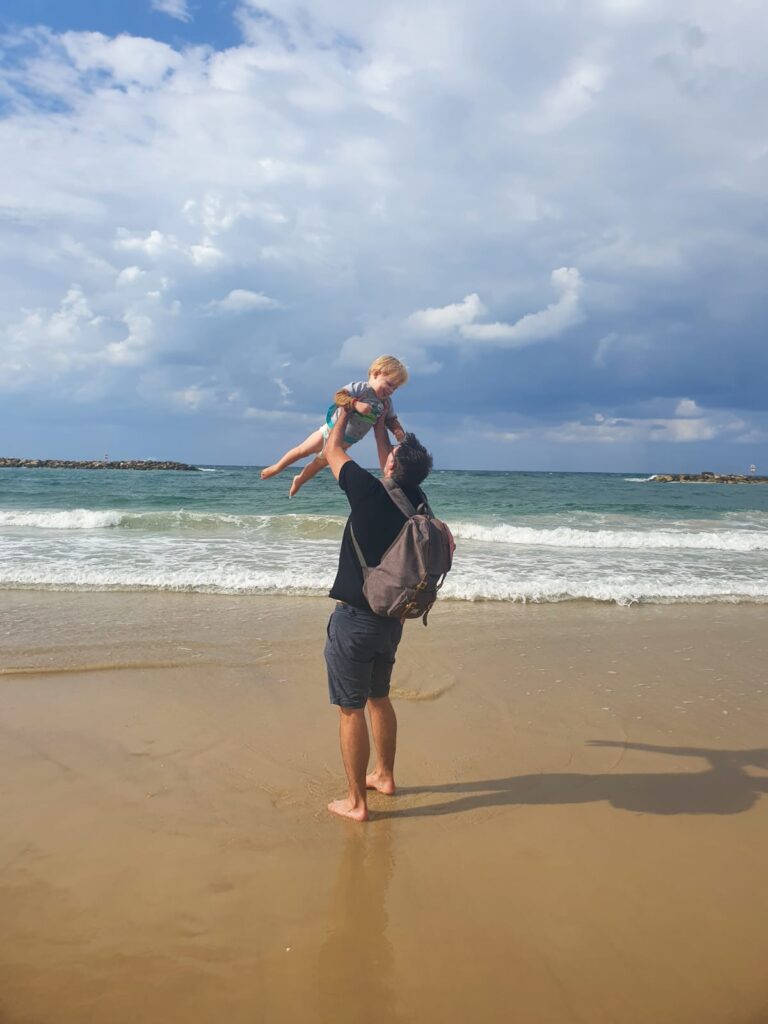I mulled it over. Was I really being negative? It didn’t feel like I was being negative yet the person across from me clearly felt very differently.
I tried again. “It’s not that I don’t think he’ll ever speak, I’ve just stopped expecting it to happen. I’m not going to obsess over it anymore”.
“But you have to have hope”.
“I do have hope”, I insisted. “But hope is different from expecting things to happen”. I came away from that conversation feeling deflated. Just because I’d stopped expecting milestones to be reached, didn’t mean that I had become hard, cold and negative. Actually, I felt the opposite. I felt lighter, happier and able to enjoy being a mother again. Perhaps truly for the first time since we’d realised development (or lack of) would be at the forefront of just about everything.
Just the other day a conversation with my husband cemented my thoughts. “Maybe he’s catching up” I said to him when our son did something new. I kept a poker face while my eyes searched his. I waited. Then, the corners of his mouth turned up and we both laughed, the kind of dirty guffaw that only two people sharing dark humour come out with.
‘Catching up’: the words that once plagued us had now become an in-joke. It wasn’t that long ago that hearing them or even seeing them had felt like tiny cuts.
“See!” people declared triumphantly after Kasper mastered a new skill. “He’s catching up!” My body would suddenly feel very tired. I’d slowly close my eyes and sigh silently. Those comments don’t bother me anymore. Catching up is no longer an objective that dominates our lives. It now hurt less when someone asks “how’s Kasper?” in a long, slow drawn out voice tinged with something bordering pity. I can answer “he’s doing great!” and really mean it. He is doing great. I am proud of him every day.

It’s been quite the journey to guffawing over these innocent-seeming words and letting careless comments go but it’s not been a smooth one. When my son was 9 months old, we were told that his development was delayed by about 3 months but with medication to get his infantile spasms under control and therapy, there was a chance he would catch up. Fuelled by these words we set about doing everything we could to close that gap.
3 months later that developmental gap between where he was and where he ‘should have been’ was now 6 months. We scratched our heads with confusion. But… we’d done the weekly physio and play therapy as recommended. We’d done daily exercises at home. We’d got his seizures under control. Why wasn’t it all working? Why wasn’t that gap closing? What were we doing wrong?
I enrolled on an online speech therapy course.
I started learning Makaton.
I studied physiotherapy exercises on YouTube.
I trawled Facebook support groups for advice.
I bought specific equipment and toys.
I read books on the effects of camels’ milk.
I gave my son camels’ milk (I know).
I spent hours doing therapy with him.
I researched the Nemechek protocol.
I squinted at research papers and statistics.
None of it worked. The developmental gap continued to widen.
We’d heard anecdotally that the anti-seizure med Kasper was on could also stall development so when the end of the 10-week wean was in sight, we were relieved and excited. Not only were the unwanted side effects over (being spaced out and an insomniac), we were about to see those developmental gains speed up. We beamed with joy as our son’s personality began to shine through the fog of drugs but his development? It continued to chug along at its slow and steady pace.
And then it dawned on me.
He’s not going to catch up. No matter what we do.
In fact, we don’t have control over his development.
I shared my revelation with my husband and he just looked at me. I could tell by the look on his face that he had been waiting for a long time for me to finally catch up. I thought about all the hours I’d wasted researching, comparing, worrying and obsessing over his development. I thought about all the guilt I’d felt for not doing enough to help him while spending every waking moment doing everything and more.
Friends, family, therapists, doctors and strangers in Facebook groups had all had me believe that ‘catching up’ was a tangible goal and that if we just did enough of [insert magical solution here], we would get there.
The support groups have weekly posts boasting “success” stories of children who were not only seizure free but completely developmentally caught up. With a magical combination of prayer, therapy and hope, anything is possible! Just believe! Don’t give up hope!
The toxic positivity doesn’t just exist in the privacy of these groups; it seeps into just about all aspects of our lives. In the media we are bombarded with stories of people overcoming their disabilities. Paralysed folks walk again, children with devastating prognoses prove the doctors wrong and videos of deaf children hearing for the first time melt hearts all over the world. Miracles!
Books, fad diets, supplements and oils are offered as holy grails by crooks ready to prey on desperate parents searching for cures.
The importance of early intervention is rammed down parents’ throats until we choke on the guilt of not doing enough therapy or doing too much.
There are days when it felt like the responsibility for my child’s development rested entirely in my hands. The constant barrage of information and guilt fanned the flames of increasing anxiety.
The truth is, it will never be enough. No amount of therapy, camels’ milk, supplements or essential oils will change who my child is and where he is meant to be. While therapies are certainly helpful, they are not a cure. There is no magic fix for his disabilities or development. In fact, there doesn’t need to be one in the first place. My child needs support, not fixing. Not only did I lose my sanity while searching for a solution, I lost precious quality time with my son that I’ll never get back.
Having my son made me examine my unrealistic and unfair expectations of him, dismantle my ideals of success and detach myself from typical developmental milestones and hurl the lot in the bin. I can now appreciate my son for who he is not what he can and cannot do. I don’t care what children his age are able to do or what society says he should be doing anymore. My son is loved, appreciated and honoured for just being himself.
I wish I could say I got there sooner.
But I’m so glad I finally did.
And now when Kasper does do something new, it’s all the more sweeter because I didn’t expect it and I didn’t waste previous time obsessing over making it happen. When I walked through the front door of our new apartment in July, filthy after spending all day cleaning our old place, and heard “mama!”, I burst into tears. But these weren’t tears of relief but tears of surprised joy. Each one of those tears represented all the tiny steps on the journey I’d been on to get to that point.
So, the next time someone says “he’s catching up!” I can make a choice. I can say nothing or I can say “no, he’s not and he won’t. He’s exactly where he’s meant to be”. Then I can go home and have a good dark chuckle with my husband and move on with our lives.

